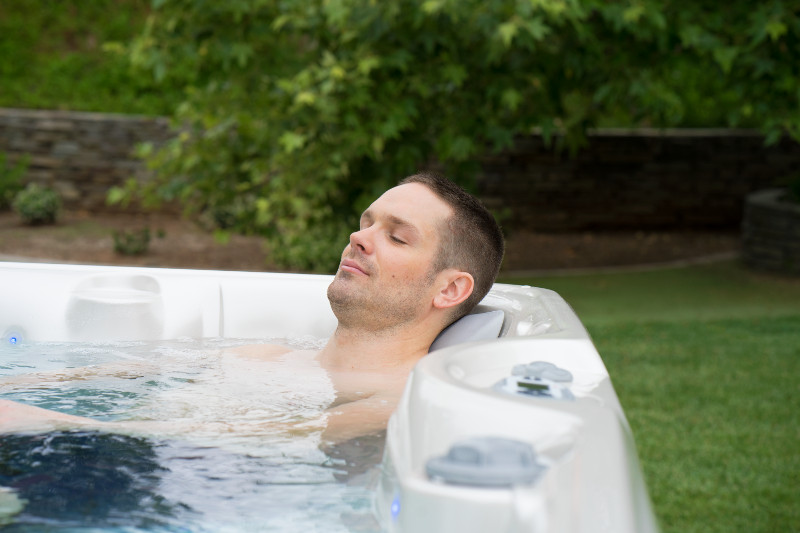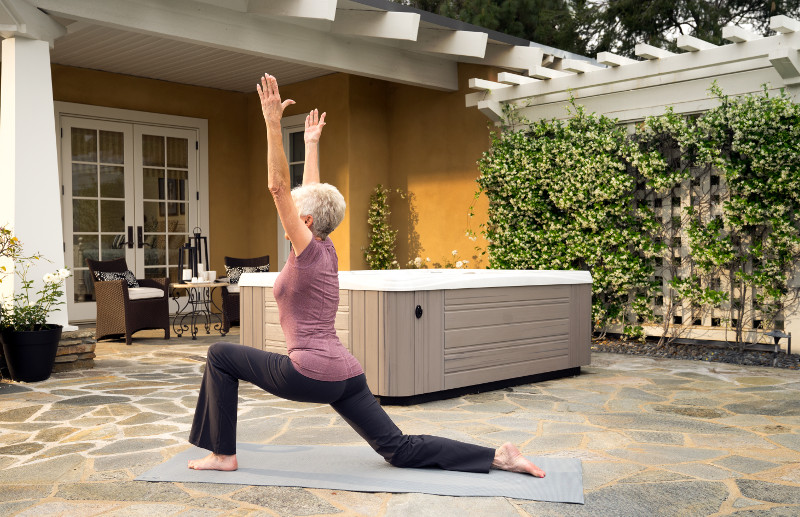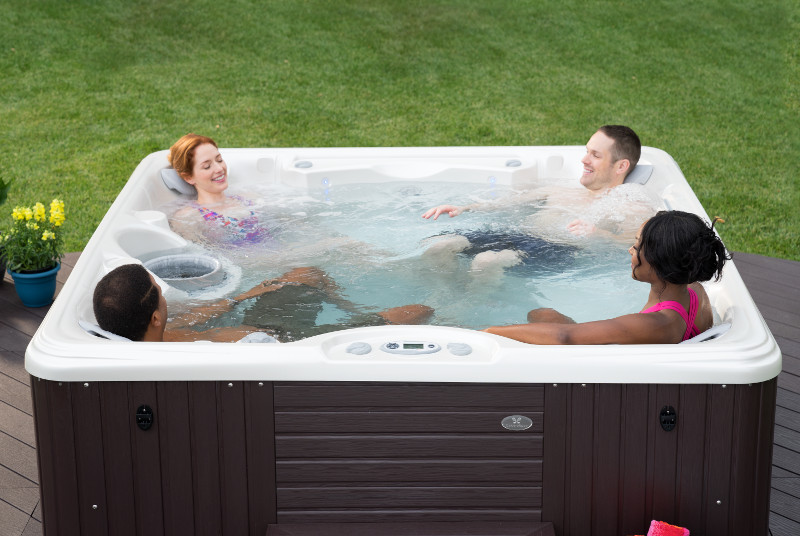Today, my wife and I support each other in that same commitment, using our own hot tub every morning as a way to kickstart the day. We step out of our 20-minute soaks feeling energized and empowered to keep making healthy choices. And we both agree that if we miss a morning soak, we feel sluggish and out of sync with our other healthy routines.
The overall benefits of hydrotherapy are known to many, but as we’ve learned from our own hot tub experiences, the benefits of daily immersion can transform your life from the inside out.
Better Health Through Hot Tub Hydrotherapy
As a digital marketer for Watkins Wellness, the global leader in hot tubs, I see the comments on our website from customers who share the many ways hot tub immersion can transform the body and mind.
Renewal
When hot tub hydrotherapy is an ingrained self-care practice, rather than an occasional luxury experience providing a few moments of relief, you build a lifestyle around proactive revitalization. Daily immersion renews your body’s suppleness and can help you achieve relaxation and a calm state of mind to keep you present throughout the day.
 The best hot tubs for hydrotherapy are designed to give you a personalized experience of relaxation and stress relief. Simple controls allow you to adjust the temperature and jet intensity every time you soak. The option of built-in aromatherapy, along with features such as mood lighting or a waterfall, can create just the right ambiance. With the perfect hot tub environment for relaxation, you can decrease stress and anxiety, improve sleep, and set the stage for health and wellness. Just 20 minutes of water immersion a day can work in tandem with your healthy practices to keep you motivated.
The best hot tubs for hydrotherapy are designed to give you a personalized experience of relaxation and stress relief. Simple controls allow you to adjust the temperature and jet intensity every time you soak. The option of built-in aromatherapy, along with features such as mood lighting or a waterfall, can create just the right ambiance. With the perfect hot tub environment for relaxation, you can decrease stress and anxiety, improve sleep, and set the stage for health and wellness. Just 20 minutes of water immersion a day can work in tandem with your healthy practices to keep you motivated.
Rejuvenation
A hot tub is an incredible resource for preparing the body for activity. Warm water immersion helps loosen muscles, ease stiffness that can lead to strain and injury when exercising, and relieve mild joint pain. A 20-minute soak before each workout can improve circulation and flexibility as the body warms up.
 After a workout, a hot tub can soothe overworked muscles. Hot Tub Circuit Therapy, which is similar in style to the circuit therapy a personal trainer might apply to strengthen muscle groups one at a time, uses specially designed and positioned jets to massage targeted muscles and relieve tension. A warm soak combined with jet massage after exercise can soothe sore muscles and assist in body recovery, so you’ll be ready for your next exhilarating workout.
After a workout, a hot tub can soothe overworked muscles. Hot Tub Circuit Therapy, which is similar in style to the circuit therapy a personal trainer might apply to strengthen muscle groups one at a time, uses specially designed and positioned jets to massage targeted muscles and relieve tension. A warm soak combined with jet massage after exercise can soothe sore muscles and assist in body recovery, so you’ll be ready for your next exhilarating workout.
If you’re interested in cold water therapy to help reduce inflammation and rejuvenate overworked muscles after your workouts, consider a hot tub that offers the option of CoolZone technology. This feature allows you to efficiently control water temperature within a wider range (from 60 to 104 degrees) for ultimate customization of your hot tub hydrotherapy. Plus, it provides for a cool and rejuvenating dip when the weather is warm.
Reconnection
If you’re just beginning your daily immersion routine, or if you tend to procrastinate due to a busy schedule, consider asking others to join you for inspiration to succeed. With the support of a few allies, who can hold you accountable to your intentions, you may become more committed to your wellness and lifestyle goals.

Whereas some spas are designed with a small footprint for individual use, others offer the space to share the benefits of hot tub hydrotherapy with your partner, with family, or with friends. Precise temperature controls allow you to adapt the soak to suit children and other temperature sensitive individuals. Entertainment features, such and a wireless TV/video monitor, can provide fun, memorable experiences.
Hot tub water immersion on a daily basis isn’t just therapeutic for your body and mind; it’s also healthy for your social life and closest relationships.
Immerse Yourself in the Hot Tub Lifestyle
Hot tub hydrotherapy can be a luxury you indulge in once in a while or a daily practice to help lower stress, ease physical tension, nurture relationships, and inspire regular self-care. I know that by letting my hot tub stand at the center of my circle of wellness, I cultivate a constant commitment to good health, happiness, and the lifestyle I envision. You can do the same.














